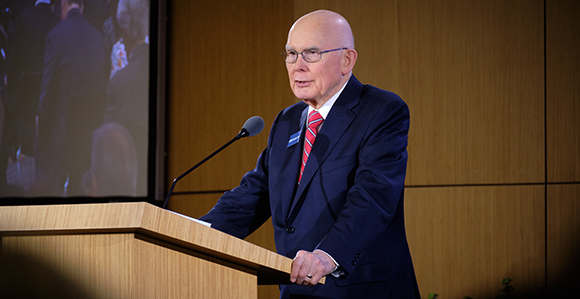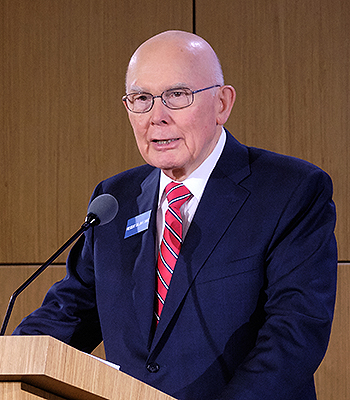Commitment to Christ Fundamental for Missionaries, President Oaks Tells New Mission Leaders
Contributed By Scott Taylor, Church News managing editor

President Dallin H. Oaks, First Counselor in the First Presidency, speaks Monday, June 24, at the New Mission Leadership Seminar held at the Provo Missionary Training Center in Provo, Utah.
Article Highlights
- Understand and be committed to the Savior Jesus Christ.
- Use the Book of Mormon as a central message and teaching method.
- Teach by the Spirit to proclaim the gospel.
“We want our missionary efforts to . . . bring people into the Church and nurture them so that they will develop meaningful relationships with their Savior and with members.” —President Dallin H. Oaks
Related Links
PROVO, Utah
Saying the fundamentals of leading missionaries have not and will not change, President Dallin H. Oaks of the First Presidency charged new mission leadership couples to “teach and model these eternal fundamentals.”
The First Counselor in the First Presidency shared the fundamentals and other topics with the 164 couples of new mission presidents and companions attending the Monday, June 24, sessions of the 2019 New Mission Leadership Seminar held at the Provo Missionary Training Center.
Most on his list were fundamentals the new leaders will teach to and train their missionaries with. One, however, was just for the leaders in working with and preparing the rising generation of future Church leaders.
“In order to care for your missionaries, you must know them,” he said. “Spend the time in study and personal interviews to get to know your missionaries well.
“This will guide and empower you when you need to teach, counsel, discipline, and deal with the many questions that will come as you preside over hundreds of young men and women. There is no substitute for knowing a missionary well.”
Helping missionaries to understand and practice repentance is an essential part of this caring, he added, then quoting President Russell M. Nelson: “When we choose to repent, we choose to change! We allow the Savior to transform us into the best version of ourselves” (“We Can Do Better and Be Better,” Ensign or Liahona, May 2019, 67).
The Fundamentals of Leading Missionaries
Understanding of and Commitment to the Savior Jesus Christ
The greatest fundamental of leading missionaries, he said, is one’s understanding of and commitment to the Savior Jesus Christ. “Our most important possession in our testimony of the risen Lord and His central role is the plan of salvation and in His restored gospel,” President Oaks said. “This is the unique truth we seek to share with others.”

President Dallin H. Oaks, First Counselor in the First Presidency, speaks Monday, June 24, at the New Mission Leadership Seminar held at the Provo Missionary Training Center in Provo, Utah.
Missionary service is a joyful opportunity. “Live that reality, and teach it to your missionaries.”
Using the Book of Mormon as a Central Message and Teaching Method
Central to the message and teaching methods is the Book of Mormon, with missionaries needing to learn its truths, know how to ponder and pray over them, and know how to use the Book of Mormon to answer their questions in order to help others learn to do the same. “They must internalize the power of the Book of Mormon in teaching the restored gospel first by applying it in their own lives and then by sharing it with those they teach.”
Teaching by the Spirit
The principles of teaching are fundamental to proclaiming the gospel, particularly that of teaching by the Spirit. “This must be learned by young missionaries, it must be demonstrated by their leaders, and it must be practiced continually,” he said. “Essential to teaching by the Spirit is to maintain the worthiness and obedience necessary to have the companionship of the Spirit, by which we teach.”
Impacts of Recent Changes
President Oaks underscored the impact on teaching from two recent changes made by President Russell M. Nelson—the allowance of missionaries to call home on their preparation day and the emphasis of a home-centered Church.
Of missionaries calling home, President Oaks noted the positive effects on younger siblings having closer contact with their missionary brother or sister, as well as missionaries being strengthened as their parents encourage them to be faithful and consecrated in their service.
But he cited a Church News article that warned against missionaries relying on only verbal and digital communications. “Our greatest learning, deepest spiritual moments, and most heartfelt messages are often found in handwritten notes, letters, and journal entries,” he quoted. “Writing connects to a different part of the brain and often creates a clarifying connection to the things of the soul. There is deeper understanding to be gained when you are free to write the things of your soul.”
With a home-centered Church, missionaries can teach members the principle of personal invitations to their friends and neighbors—to “come and see” or to “come and help” and be engaged in unthreatening ways.
“If missionaries make such suggestions part of their conversations with members and their meetings with ward mission leaders,” he said, “this new initiative of a home-centered Church will increase their teaching opportunities.”
Additional Subjects for Teaching, Counseling
President Oaks also highlighted several other subjects that mission presidents should have in their teaching of or individual counseling with missionaries.
Today’s young missionaries have grown up in a sexualized environment, which includes overt temptations, a seductive advocacy of sin. They also experience the popularization of gender labels “that invite youth and even children to label themselves in ways that work against the light of the gospel and the opportunity to progress toward our eternal destiny,” he said.
Also, many missionaries the new leaders will supervise have not had the same opportunities to learn how to work as past generations. “Many have never learned how to work in a sustained way on something they’ve not chosen to do,” he said. “Be conscious of that when you evaluate reports about the activities of missionaries who have not yet become accustomed to missionary work.”
An ever-higher percentage of missionaries come from families weakened by divorce or other disunity that may create distractions or limit preparation. “By your example and your teaching, help them overcome their insecurities, their anxieties, and their fear of the marriage we hope comes naturally and timely after their missions.”
President Oaks encouraged mission leaders to teach their missionaries how to find people to teach, how to plan to find, and how to encourage others to find. One suggestion was to be looking for persons to speak to throughout the day; another was involving the members to pray for the Lord’s help to find persons prepared to receive the message of the restored gospel.
“To be most effective, prayers for this kind of inspiration should be accompanied by a commitment—something the scriptures call ‘real intent,’” he said. “In their prayers they should promise the Lord that if He will inspire him or her to speak to someone about the restored gospel, they will do it.”
Regarding retention, President Oaks asked mission leaders to help missionaries “to see the end from the beginning” and encouraged additional finding emphasis on families as well as on older youth and young adults.
Persons being taught should be invited to be baptized, “but the invitation should not be programmed rigidly into the first lesson,” said President Oaks, acknowledging that President M. Russell Ballard, Acting President of the Quorum of the Twelve Apostles, would be speaking on that topic in a subsequent session.
He emphasized the importance to “establish the Church” (see Doctrine and Covenants 28:8; 3 Nephi 21:22), with new converts needing to follow the covenant path and be anchored by the Atonement of Jesus Christ.
“We are not interested in just getting a lot of people baptized,” he said. “We want our missionary efforts to bring real growth, which means to bring people into the Church and nurture them so that they will develop meaningful relationships with their Savior and with members.”
